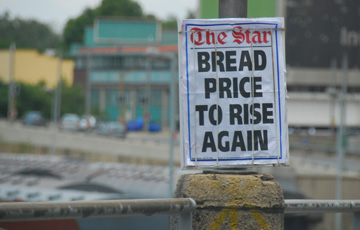|
Web Extra Thursday, February 28, 2008
Where's the wheat?
| The rising cost of wheat has led to rising food prices around the world. A poster on a bridge in Johannesburg, South Africa, shows a recent headline from The Star, a local newspaper. |
Heller’s Bakery in northwestern Washington, D.C., has been a cornerstone of the Mt. Pleasant neighborhood since the 1920s. But lately times are tough. Never before has flour — a staple item in a bakery — been so expensive. “Even though I raise the prices, it’s still not enough,” says Erland Duni, one of the bakery’s owners.
Blame the rising cost of flour on the rising cost of wheat, which climbed from $6.04 per bushel in August to $11.04 in February. And blame the rising cost of wheat on a wheat shortage. But don’t try to blame the wheat shortage on the biofuels industry, experts say. It has more to do with the fickle weather and high demand.
Opponents of the biofuels industry often argue that, as more crops go to fuel production, food will become scarce and costly. In a May 2007 article in Foreign Affairs, University of Minnesota professors C. Ford Runge and Benjamin Senauer wrote that wheat prices have “surged to decade highs” because “farmers are planting more acres with corn and fewer acres with other crops.”
Certainly demand for ethanol has driven up the price of corn (and consequently corn-based foods and meat that comes from corn-fed livestock), but farmers have yet to abandon wheat in favor of corn. In the United States, the total amount of farmland devoted to wheat has actually increased by almost 3 million acres since 2005 and is expected to increase another 3 million acres this year, says Kim Anderson, an agricultural economist at Oklahoma State University in Stillwater.
The problem isn’t acreage, it’s yield, Anderson says. For at least two years, the fields haven’t been producing what they should because of freezes and droughts during the growing season and rain at harvest time. “If we would have had average or better production, stocks wouldn’t be this tight and prices wouldn’t be this high,” he says. This past year was especially hard. “Because of poor harvest conditions around the world [in 2007], production of wheat was probably about 1.3 billion bushels below expectations,” Anderson says.
Meanwhile, demand has increased. “Tight U.S. supplies combined with reduced export competition have driven importers to buy U.S. wheat at a pace not seen since the 1970s,” wrote U.S. Department of Agriculture’s Gary Vocke in the November 2007 issue of the agency’s magazine, Amber Waves. Lower than expected supplies coupled with high demand have led to wheat deficits. Worldwide wheat consumption has surpassed production for the past three years. Now U.S. wheat reserves are the lowest they’ve been since the late 1940s and world reserves are down to 1970s levels — thus the high prices.
But not everyone is complaining. The high cost of wheat means more money for farmers, who often lose money growing the crop. “They’ve gone though many years of red ink,” says Neil Fisher of the North Dakota Wheat Commission. “It will allow them to pay down some debt.”
What’s good for farmers, however, isn’t always good for bakers. “It’s hard,” Duni says. “We cut corners and try to survive. Hopefully it will work out.”
Links:
Heller's Bakery
Foreign Affairs article
Kim Anderson's Web page
Amber Waves article
Paul Keller's photos

 Subscribe
Subscribe



